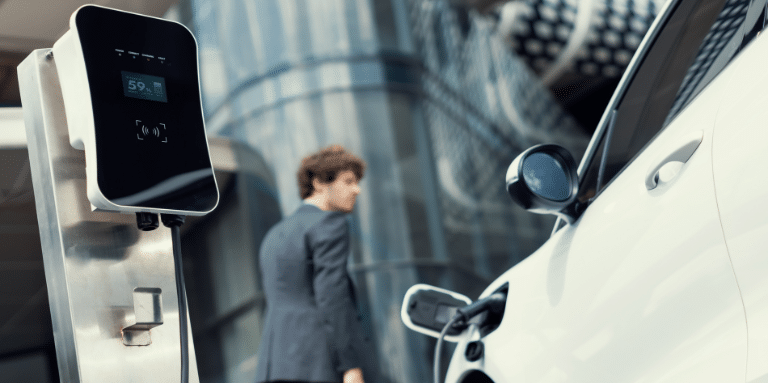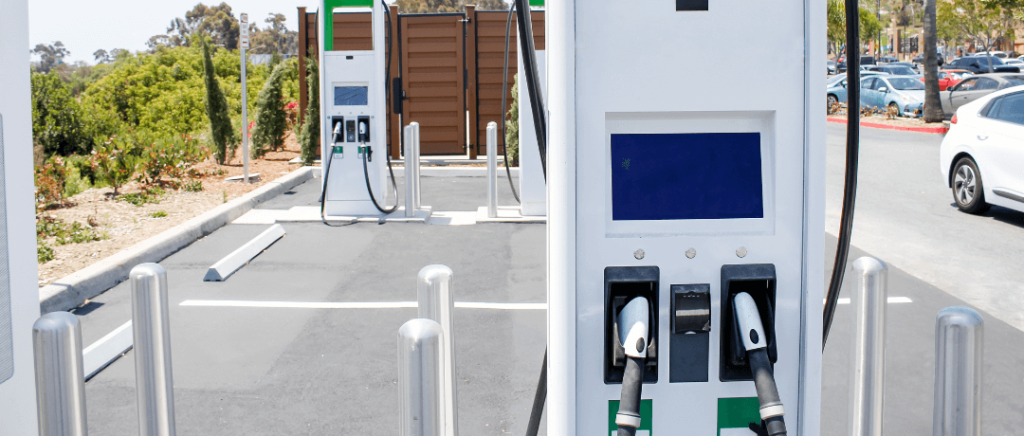Who covers the cost of recharging company cars?
Is it compulsory for employers to cover the cost of commuting to and from work?

The cost of recharging company electric cars is generally covered by the employer, but is not compulsory for home-to-work journeys. Unlike public transport, for which the employer must cover 50% of the cost, there is no legal obligation to cover the cost of individual transport, including electric vehicles.
However, many companies choose to cover these costs to encourage the adoption of electric vehicles, build employee loyalty and promote sustainable mobility.
This can be done in various ways, such as reimbursing actual expenses, using increased mileage allowances for electric vehicles, or installing charging stations at the workplace.
Can my employer finance the installation of a charging station at my home?
Employers can indeed finance the installation of a charging station at the home of an employee who has a company electric car. Although not compulsory, this practice is becoming increasingly common, as it offers a number of advantages. It enables the company to encourage the adoption of electric vehicles, simplify the management of recharging for its employees, and benefit from lower off-peak electricity rates.
Financing can cover both the installation of the charging station and the electricity costs associated with recharging the vehicle. This solution also facilitates tracking and reimbursement of charging costs, which can be managed via connected supervision systems or specialized fleet management software.
It is important to note that electricity used for recharging, whether supplied free of charge or at a reduced rate by the employer, is considered a benefit in kind tax-free for the employee.
PLEASE NOTE: FROM JANUARY 1ᵉʳ, 2025, FREE CHARGING OF ELECTRIC VEHICLES AT WORK WILL NO LONGER BE AVAILABLE TO EMPLOYEES.
What happens to a recharging point installed on an employee's premises at the end of the employment contract?
At the end of the employment contract, the charging station installed at an employee's home generally remains with the employee. If the charging station is not removed, URSSAF provides for specific tax and social security treatment: the employer's contribution is excluded from social security contributions, limited to 50% of the actual expenses incurred for purchase and installation, with a ceiling of €1,000.
This treatment is designed to encourage the adoption of electric vehicles and facilitate access to charging stations for employees, even after their contract has ended. If the charging station is withdrawn, the purchase and installation costs borne by the employer are fully excluded from social security contributions.
In short, leaving the charging station with the employee after the end of the contract benefits from advantageous tax and social security treatment, encouraging the long-term use of electric vehicles.
Is the use of a company charging station a benefit in kind?
Since January 1, 2020, the provision of an electric vehicle charging station by the employer at the workplace is not considered a benefit in kind, allowing employees to charge their vehicles free of tax and social security contributions until December 31, 2024.
However, there are two exceptions: if the employer covers all or part of the cost of installing the charging station at the employee's home, 50% of this cost is considered a benefit in kind and must be included in social security contributions; similarly, if the employee uses the charging station to recharge a plug-in hybrid vehicle for private purposes, 50% of the cost of the electricity consumed is included in social security contributions.
It is important to note that the tax exemption only applies to electric vehicle charging stations installed in the workplace, even if they are accessible to customers or visitors to the company, and does not apply to charging stations installed in employees' homes or to plug-in hybrid vehicles.
How does electric recharging work for company cars?
Home recharging costs
Home charging of company electric vehicles is a practical option for many employees. Here's how it usually works:
- Installation: The company can pay for the installation of a charging station at the employee's home.
- Metering: A dedicated electricity meter or intelligent metering system is often installed to precisely quantify the electricity used to recharge the vehicle.
- Reimbursement: The company reimburses the recharging costs to the employee, generally on the basis of the dedicated meter readings.
- Flat-rate: Some companies opt for a flat-rate monthly reimbursement based on estimated average consumption.
- Recharge card: In some cases, the company provides a specific recharge card for use at home, the cost of which is billed directly to the company.
Charging stations for businesses
Increasingly, companies are providing on-site charging stations for company electric vehicles. Here's how it usually works:
- Installation: The company installs charging stations in its parking lot or on its premises.
- Types of terminal: These can range from slow-charge terminals (3-7 kW) to fast-charge terminals (50 kW and more), depending on requirements.
- Access system: Bollards are often equipped with an identification system (badge, smartphone app) to control access and track usage.
- Charge management: An intelligent management system can be set up to optimize charging according to vehicle use and electricity tariffs.
- Billing: Charging at the workplace is generally free of charge for employees using company cars.
- Maintenance: The company provides service and maintenance for the charging stations.
- Reporting: Tracking tools enable the company to monitor terminal use and energy consumption.
How is an electric car charging station installed?
What are the advantages of electric company cars for employers and employees?
For the employerthe adoption of electric vehicles offers a number of advantages: reduced costs thanks to lower fuel and maintenance costs compared with combustion-powered vehicles; tax benefits in the form of grants and measures to encourage investment in an electric fleet; improved brand image by demonstrating the company's commitment to the environment, which can attract customers who are sensitive to this approach; and, last but not least, greater compliance with new regulations requiring the gradual phasing out of polluting vehicles.
For the employeethe use of electric vehicles offers a number of advantages: substantial savings on fuel costs, particularly for home-to-work journeys or regular business trips, a specific tax regime with a 50% allowance on the benefit in kind (capped at €1,800 per year) until December 31, 2024, a 20% increase in mileage allowances for business trips with a personal electric vehicle, the reduction of thecarbon footprint contributing to the fight against climate change, improved driving comfort (silence, absence of vibrations) and safety innovations, as well as a personal enhancement by using an ecological vehicle, reinforcing the feeling of belonging to an environmentally-conscious company.
These combined advantages make electric company vehicles increasingly attractive to companies and their employees.
See also: Charging stations for employees: what are the benefits?
Find out how our customer easily installed a charging solution at his company with Beev!
Steps to submit a claim for reimbursement of the cost of recharging a company electric vehicle
Here's a step-by-step guide to submitting a claim for the cost of recharging a company electric vehicle, along with tips to make the process easier:
To begin with, it's essential to meticulously keep all your charging records. This includes detailed invoices for recharges at public charging stations, consumption records from your home charging station, and data from a connected charging station if available at home.
Next, make sure you understand your company's reimbursement policy. This can vary from a reimbursement based on actual usage and presentation of receipts, to a monthly flat rate or the use of a company-supplied energy card.
To prepare your claim, gather all the necessary documents such as the claim form, recharge receipts and details of business trips if required.
Once you have all your documents, submit your request to the appropriate department, usually accounting or human resources, following the established internal procedure.
Make sure you keep a close eye on your request, and don't hesitate to follow up if necessary to ensure that everything is processed on time.
To speed up the process, use a connected kiosk for automated tracking of home recharges, and opt for a company energy card to simplify recharges at public kiosks. It's also advisable to submit your claims regularly to avoid accumulating receipts, to scan your documents for easier transmission, and to use mobile apps where available to track and declare your recharges.
By following these steps and providing clear, complete supporting documentation, you can optimize the processing of your claims for reimbursement of the cost of recharging your company electric vehicle.
Sustainable mobility package: up to €700 a year for electric cars
In France, the sustainable mobility package (FMD) enables companies to pay up to €700 a year, exempt from social security contributions and income tax, for their employees' home-to-work journeys, thus encouraging the use of environmentally-friendly modes of transport such as electric cars, self-service bicycles, public transport, car-pooling, and journeys by bicycle or electric scooter; to benefit from it, employees must present proof to their employer. Although not compulsory, this scheme, which can be combined with other aid such as the conversion bonus or the bonus écologiquecan improve employees' quality of life and reduce companies' environmental impact.
Find out more: Aid for the installation of charging stations in 2024
Conclusion
Although not compulsory for home-to-work journeys, it is often adopted as a way of encouraging sustainable mobility. Companies can reimburse actual expenses, offer increased mileage allowances, or install charging stations at the workplace and sometimes even at employees' homes.
Electric company vehicles offer advantages for both employers and employees, including lower costs and tax benefits.
For more information, we've put together a guide to this topic to explore the different aspects in depth:
If you would like to know more about the charging station tax credit at 2024please consult our article on the subject.
Read our article about :
To facilitate this transition, Beev offers solutions for the purchase of electric vehicles and the installation of charging stations in companies.
Our experts will advise you according to your needs. Beev offers 100% electric vehicles from Tesla at the best prices, as well as recharging solutions.

































